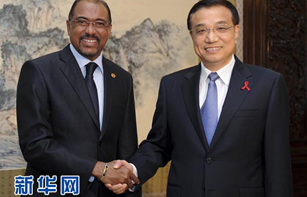
UNAIDS Executive Director Michel Sidibé (left) and China’s Vice Premier Li Keqiang.
Credit: Xinhua News Agency
During an extended country visit to China UNAIDS Executive Director Mr Michel Sidibé met with China’s Vice Premier Li Keqiang to discuss how China is scaling-up their response to HIV. In their meeting, Mr Li stressed that Getting to Zero—UNAIDS strategy calling for zero new HIV infections, zero discrimination and zero AIDS-related deaths worldwide––constitutes a guiding vision for China’s national HIV strategy.
Mr Li, who is also the Chair of the State Council AIDS Working Committee, noted that the “Three Zeros” are key objectives for China’s response to HIV and that China is committed to turning the vision into a reality. “The Three Zeros can be achieved. We are mobilizing a movement to achieve this,” said the Vice Premier during discussions with Mr Sidibé. “I am committed and the government is committed to making this happen.”
The Three Zeros can be achieved. I am committed and the government is committed to making this happen.
Vice Premier of China Li Keqiang
There are around 740 000 people living with HIV in China, which has a national HIV prevalence of 0.06%. However according to government figures, approximately 5% of men who have sex with men in China are living with HIV—88 times higher than the national average. Another key population at higher risk are people who inject drugs, which in 2009 accounted for more than 24% of new HIV infections.
Vice Premier Li noted that China has made important progress in its response to HIV, but that the situation remains serious and new ideas and approaches will be necessary for success. “The challenges remain” said Mr Li. “HIV infections due to sexual transmission and drug use need to be reduced. More needs to be done in these fields.”
In recent years, China has taken bold, evidence-informed action to strengthen its response to HIV
UNAIDS Executive Director Michel Sidibé
Mr Li also stressed the importance of full community participation in the HIV response and of the government’s commitment to facilitating this participation. According to Mr Li, community-based organisations play an irreplaceable role in HIV prevention and in eliminating discrimination. “The government will provide powerful support to these organisations,” he said.
During the meeting, Mr Sidibé commended China’s strong and sustained leadership in its response to HIV, as well as its adoption of new approaches. “In recent years, China has taken bold, evidence-informed action to strengthen its response to HIV,” said Mr Sidibé. “Whether it is China’s large-scale roll-out of methadone maintenance treatment, nationwide scale-up of antiretroviral treatment or strong investment in preventing mother-to-child transmission of HIV, China is at the forefront.”




